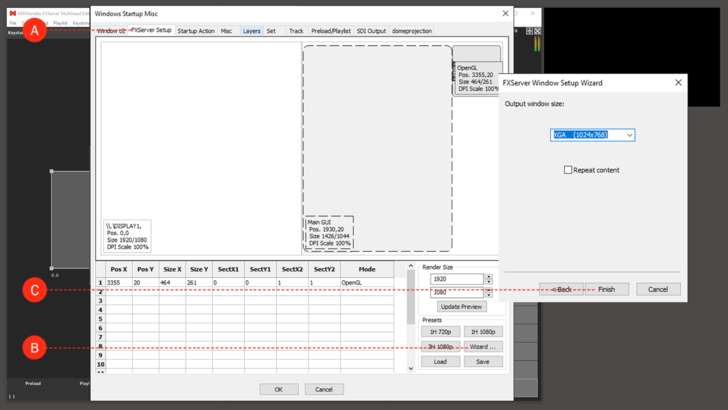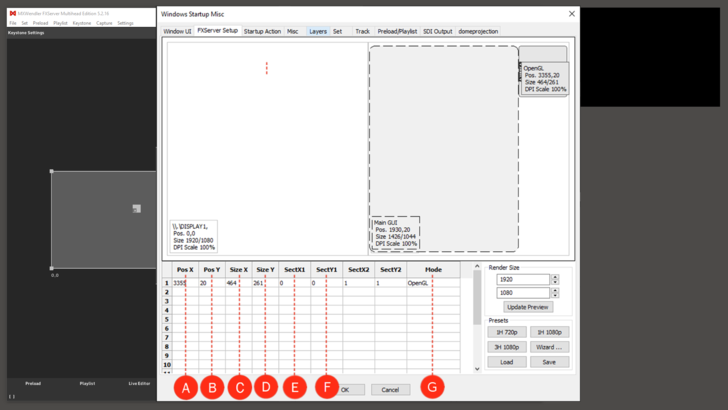Tutorial FXServer Output Windows: Difference between revisions
No edit summary |
No edit summary |
||
| (7 intermediate revisions by the same user not shown) | |||
| Line 1: | Line 1: | ||
This tutorial applies to all different OS and MXWendler versions. | |||
<div class="noprint"> | |||
== Introduction== | |||
</div> | |||
This tutorial explains how the output windows are set up in FXServer. | This tutorial explains how the output windows are set up in FXServer. | ||
First the arrangement of the displays (number and positioning, definition of the UI monitor) has to be set up in the system preferences (PC/Mac) under display settings. Here you find also the resolution of the connected displays/projectors. | First, the arrangement of the displays (number and positioning, definition of the UI monitor) has to be set up in the system preferences (PC/Mac) under display settings. Here you find also the resolution of the connected displays/projectors. | ||
==Wizard Setup== | ==Wizard Setup== | ||
1. Open FXServer Setup in the FXServer Windows Settings: '''(A)''' | |||
:'''Menu: SETTINGS → WINDOWS → FXSERVER SETUP''' | |||
2. Open 'Wizard..' and insert the number of displays/projectors, the size of the UI monitor and the sizes of the output windows corresponding to the instructions. '''(B)''' | |||
3. Click 'Finish' to save the settings. '''(C)''' | |||
4. Restart FXServer to take over the settings. | |||
[[File:FXServer_Widows_1.png|728px]] | [[File:FXServer_Widows_1.png|728px]] | ||
==Manual Setup== | ==Manual Setup== | ||
The output windows | The output windows can be set up manually over the table below. Each row stands for an output window, the UI monitor is not listed in the table.<br> | ||
On the picture, you can see an example with 2 monitors, which are placed side by side. The 1st monitor is used as UI monitor and is therefore not listed in the table. The 2nd monitor is used for the output. The output is always defined from 0 to 1. 0 marks the start, 1 marks the end of the output (height/width). | |||
On the picture | |||
'''Example with 2 Video Projectors:''' | |||
Y1..Y2 is always 0..1 (the complete height) <br> | |||
X1..X2 is in the first row 0.0..0.5 (left half) <br> | |||
X1..X2 is in the second row 0.5..1.0 (right half)<br> | |||
:''' | '''Pos X''': Start position X of the output window. '''(A)'''<br> | ||
'''Pos Y''': Start position Y of the output window. '''(B)'''<br> | |||
'''Size X''': Width of the output window. '''(C)'''<br> | |||
'''Size Y''': Height of the output window. '''(D)'''<br> | |||
'''Sect X1/Sect X2''': Width range of the output section. '''(E)'''<br> | |||
'''Sect Y1/Sect Y2''': Height range of the output section. '''(F)'''<br> | |||
'''Display Mode''': Windows XP: ‘OpenGL’ or ‘DirectX’. Otherwise: always ‘OpenGL’ '''(G)''' | |||
[[File:FXServer_Widows_2.png|728px]] | [[File:FXServer_Widows_2.png|728px]] | ||
Latest revision as of 12:56, 30 March 2020
This tutorial applies to all different OS and MXWendler versions.
This tutorial explains how the output windows are set up in FXServer.
First, the arrangement of the displays (number and positioning, definition of the UI monitor) has to be set up in the system preferences (PC/Mac) under display settings. Here you find also the resolution of the connected displays/projectors.
Wizard Setup
1. Open FXServer Setup in the FXServer Windows Settings: (A)
- Menu: SETTINGS → WINDOWS → FXSERVER SETUP
2. Open 'Wizard..' and insert the number of displays/projectors, the size of the UI monitor and the sizes of the output windows corresponding to the instructions. (B)
3. Click 'Finish' to save the settings. (C)
4. Restart FXServer to take over the settings.
Manual Setup
The output windows can be set up manually over the table below. Each row stands for an output window, the UI monitor is not listed in the table.
On the picture, you can see an example with 2 monitors, which are placed side by side. The 1st monitor is used as UI monitor and is therefore not listed in the table. The 2nd monitor is used for the output. The output is always defined from 0 to 1. 0 marks the start, 1 marks the end of the output (height/width).
Example with 2 Video Projectors:
Y1..Y2 is always 0..1 (the complete height)
X1..X2 is in the first row 0.0..0.5 (left half)
X1..X2 is in the second row 0.5..1.0 (right half)
Pos X: Start position X of the output window. (A)
Pos Y: Start position Y of the output window. (B)
Size X: Width of the output window. (C)
Size Y: Height of the output window. (D)
Sect X1/Sect X2: Width range of the output section. (E)
Sect Y1/Sect Y2: Height range of the output section. (F)
Display Mode: Windows XP: ‘OpenGL’ or ‘DirectX’. Otherwise: always ‘OpenGL’ (G)

